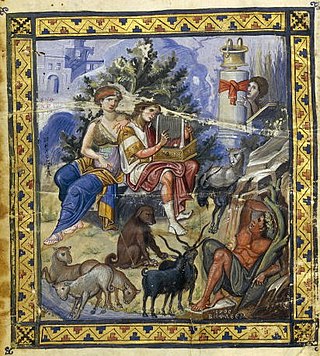
The Book of Psalms, also known as the Psalms, or the Psalter, is the first book of the third section of the Hebrew Bible called Ketuvim ("Writings"), and a book of the Old Testament.

A hymnal or hymnary is a collection of hymns, usually in the form of a book, called a hymnbook. They are used in congregational singing. A hymnal may contain only hymn texts ; written melodies are extra, and more recently harmony parts have also been provided.

The Whole Booke of Psalmes Faithfully Translated into English Metre, commonly called the Bay Psalm Book, is a metrical psalter first printed in 1640 in Cambridge, Massachusetts. It was the first book printed in British North America. The psalms in it are metrical translations into English. The translations are not particularly polished, and none have remained in use, although some of the tunes to which they were sung have survived ; however, its production, just 20 years after the Pilgrims' arrival at Plymouth, Massachusetts, represents a considerable achievement. It went through several editions and remained in use for well over a century.
"Old 100th" or "Old Hundredth" is a hymn tune in long metre, from the second edition of the Genevan Psalter. It is one of the best known melodies in many occidental Christian musical traditions. The tune is usually attributed to the French composer Louis Bourgeois.

A metrical psalter is a kind of Bible translation: a book containing a verse translation of all or part of the Book of Psalms in vernacular poetry, meant to be sung as hymns in a church. Some metrical psalters include melodies or harmonisations. The composition of metrical psalters was a large enterprise of the Protestant Reformation, especially in its Calvinist manifestation.

Psalm 23 is the 23rd psalm of the Book of Psalms, beginning in English in the King James Version: "The Lord is my shepherd". In Latin, it is known by the incipit, "Dominus regit me". The Book of Psalms is part of the third section of the Hebrew Bible, and a book of the Christian Old Testament. In the slightly different numbering system used in the Greek Septuagint and Latin Vulgate translations of the Bible, this psalm is Psalm 22.
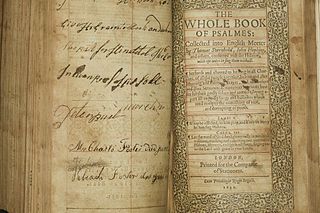
Thomas Sternhold (1500–1549) was an English courtier and the principal author of the first English metrical version of the Psalms, originally attached to the Prayer-Book as augmented by John Hopkins.
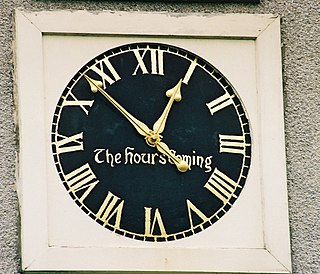
Crimond is a village in Aberdeenshire, in the northeast of Scotland, located 9 miles (14 km) northwest of the port of Peterhead and just over 2 miles (3.2 km) from the coast.
Decisions concerning the conduct of public worship in the Church of Scotland are entirely at the discretion of the parish minister. As a result, a wide variety of musical resources are used. However, at various times in its history, the General Assembly has commissioned volumes of psalms and hymns for use by congregations.

The Genevan Psalter, also known as the Huguenot Psalter, is a 1539 metrical psalter in French created under the supervision of John Calvin for liturgical use by the Reformed churches of the city of Geneva in the sixteenth century.
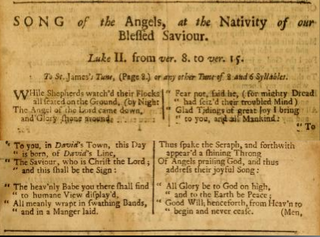
"While shepherds watched their flocks" is a traditional Christmas carol describing the Annunciation to the Shepherds, with words attributed to Irish hymnist, lyricist and England's Poet Laureate Nahum Tate. It is listed as number 16898 in the Roud Folk Song Index.
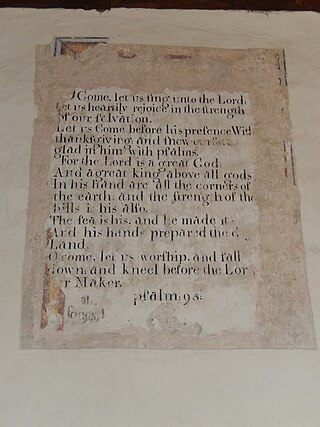
Psalm 95 is the 95th psalm of the Book of Psalms, beginning in English in the King James Version: "O come, let us sing unto the LORD: let us make a joyful noise to the rock of our salvation". The Book of Psalms starts the third section of the Hebrew Bible, and, as such, is a book of the Christian Old Testament. In the slightly different numbering system in the Greek Septuagint version of the Bible, and in the Latin Vulgate, this psalm is Psalm 94. In Latin, it is known as "Venite exultemus" or simply "Venite". The psalm is a hymn psalm, one of the Royal psalms, praising God as the King of His people. Psalm 95 identifies no author, but Hebrews 4:7 attributes it to David. The Vulgate also names David as the author.
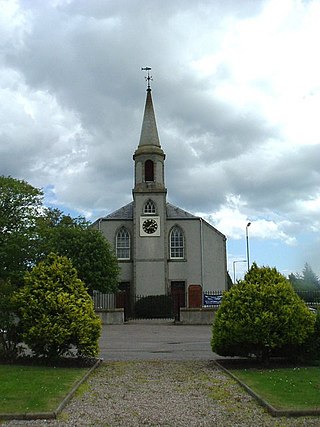
Crimond Church is a Christian, Church of Scotland Presbyterian church, located on the east side of the A90 road in the centre of the village of Crimond, Aberdeenshire, Scotland at location NK0556. It was built in 1812, to a design by Robert Mitchell, and is a Category A listed building. It is associated with the popular hymn tune "Crimond".
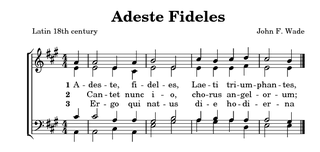
A hymn tune is the melody of a musical composition to which a hymn text is sung. Musically speaking, a hymn is generally understood to have four-part harmony, a fast harmonic rhythm, with or without refrain or chorus.
Jessie Seymour Irvine was the daughter of a Church of Scotland parish minister who served at Dunottar, Peterhead, and Crimond in Aberdeenshire, Scotland. She is referred to by Ian Campbell Bradley in his 1997 book Abide with Me: The World of Victorian Hymns as standing "in a strong Scottish tradition of talented amateurs who tended to produce metrical psalm tunes rather than the dedicated hymn tunes increasingly composed in England."
Long metre or long measure, abbreviated as L.M. or LM, is a poetic metre consisting of four line stanzas, or quatrains, in iambic tetrameter with alternate rhyme pattern ABAB. The term is also used in the closely related area of hymn metres. When the poem is used as a sung hymn, the metre of the text is denoted by the syllable count of each line; for long metre, the count is denoted by 8.8.8.8, 88.88, or 88 88, depending on style.

Psalm 24 is the 24th psalm of the Book of Psalms, beginning in English in the King James Version: "The earth is the LORD's, and the fulness thereof". In the slightly different numbering system used in the Greek Septuagint version of the Bible and the Latin Vulgate, this psalm is Psalm 23. In Latin, it is known as "Domini est terra et plenitudo eius orbis terrarum". The psalm is marked as a Psalm of David.

90 Bisodol (Crimond) is the twelfth studio album by UK rock band Half Man Half Biscuit. It was released on 26 September 2011 by Probe Plus.

Thomissøn's hymnal was a hymnal published in Denmark that received royal authorization in 1569.

The Scottish Psalter of 1564 was the first psalter or psalm book to be published in Scotland. It was published by the Church of Scotland under the influence of John Knox as part of the Book of Common Order which was a more general directory for public worship. The precise details concerning the publication of the Scottish Psalter are not known as the early records of the Church of Scotland are lost. However, it appears that its publication was determined at the Church's General Assembly in December 1562.



















